Photographs: Vaihayasi Pande Daniel
Sandra Samuel opens the door cautiously, just a few inches. Her smile is tentative, guarded.
When you tell her you have come all the way from Mumbai to talk to her, she says quietly, "One minute. I will ask madam."
She disappears into the large two-storey house, and is gone for a good ten minutes.
It is a grey, cloudy day. A chilly wind blows through the bleak, charmless north Israeli town of Afula. You are left surveying the garden, which is strewn with little Moshe Holtzberg's toys bright colored plastic animals, balls, pool sets and more.
An angry exchange of words can be heard through the door. Yehudit Rosenberg, Moshe's grandmother and Rivka Holtzberg's mother, appears at the doorway.
"I am very, very busy, I cannot speak to you," she says in a strong Israeli accent, and asks you to leave. She is dressed in a floor-length brown skirt and lavender top a tall woman, stern in an odd distracted, faraway but not unkind, manner. Her anger subsides when she realizes how far you have travelled to reach her door.
"I will ask Sandra if she will speak to you," she says softly.
Moments later, Sandra returns with Yehudit, who suggests we use the sitting area in the garden for the interview. Yehudit says she cannot come to India for the commemoration ceremony at Nariman House on the first anniversary of 26/11, because she has to be with Moshe.
She smiles wistfully, "The other day he said, 'Savta (grandmother), what colour is my hair? I wish it was a nicer colour'."
The Rosenberg home is situated on a corner, just five minutes from the centre of Afula and half a kilometre from the bus station that was the target of a suicide bomber attack some years ago.
Afula is uncomfortably close to the West Bank. It is where Rivka grew up with her eight siblings. A high wooden white fence surrounds the house, and the happy faces of Rivka and Gavriel Holtzberg smile out from handbills pasted outside. A poster of Menachem Mendel Schneerson, the Rebbe/spiritual head of the Chabad Lubavitch movement, hangs at the entrance.
It is a quiet, mildly gloomy town; population: 37,000. Sandra -- Moshe Holtzberg's nanny, and one of the bravest heroes of Mumbai's 26/11 terror attack -- who has been in Israel for 11 months now, points immediately to how different it is from living in bustling, upbeat Mumbai.
"It is nice here, clean and neat. I have been all over the place -- Tel Aviv, Jerusalem, Mount of Olives. But it is very quiet. Everyone goes from place to place in their cars. You don't see any public! Hamara (my) Hindustan is after all our Hindustan."
She sorely misses the cheerful daily confusion of Mumbai, and will go home for a vacation for ten days in December to see her sons Martin, 20 and Jackson, 26.
For Sandra, 45, whose family hails from Goa but who is a thorough Mumbaikar, 2008 was a ghastly year. In June her mechanic husband John, a Keralite, died suddenly in his sleep of an undiagnosed illness. And in November, her employers of five years, the Holtzbergs, were brutally killed in the terrorist attack at Nariman House, Mumbai.
When she managed, with scarcely comprehensible presence of mind, to scoop up the curly-haired, dazed and frightened Moshe and escaped from the beleaguered building, she became an instant icon, and poster girl for the many named, and unnamed, heroes of those 60 hours of terror.
2009 has been better. "More calm. My mind is relaxed. Man bahut soch mein rahta hai (Many thoughts wander through my mind all the time)."
She has managed to get over the recurrent nightmares that plagued her in the aftermath of the attacks. "I would dream that the terrorist attack is still happening and I am there. I think at least I could have saved his mother or done something," she says, her voice a whisper. "I had never met Jews before. But it was so nice to work for them, because they were Israelis. I like Jewish people and I just loved them. They were such good people. Very special."
'They really loved India'
Image: The house where baby Moshe lives.Photographs: Vaihayasi Pande Daniel
The Holtzbergs, who arrived in Mumbai in 2003, were initially staying at a top floor suite at the popular Shelleys Hotel near the Gateway of India for two years. That was when Sandra was first employed as a temp, helping in the kitchen and minding the couple's first child Mendel (who later died of the rare and debilitating Tay-Sachs disease that affects people of east European heritage) and later their second child, "Dovy baby" as she calls him, who was also afflicted by the same illness.
Cutting vegetables, laying the table, learn to cook and assisting with Dovy's drips were part of her job description. At the time, the apartment at Shelleys also served as a Chabad House, but on a much smaller scale, with a few random guests stopping by.
When they decided to move to Nariman House located in tiny Hormusji Street, inside chaotic, crowded Colaba Bazar, Sandra was shocked. "I told the rabbi, how can you live in an area like this in such a narrow lane? You can hardly get your car out -- and suppose something happens? I had worked in Colaba (she had worked for 20 years for various families in the area earlier) for so many years, and had never been to this place. He said: 'Never mind, it is clean inside'.
"They really loved India. Mumbai is a tough place but they still wanted to be there. They liked India's love and that people stopped by any time, and they themselves had become Indian," she recalls.
"They were very friendly. They had a good relationship with the neighbouring people. When the locals came by to collect for Durga Puja or Ganesh Puja, he would tell them I cannot give for your god. But they would explain it is for their celebration, and he would give each time Rs 1,000. I would tell him 'Rabbi make it 1,001'. He would say, 'But Sandra what will happen in Rs 1?' But he would give it."
Image: The house in Afula, north Israel, where Sandra Samuel lives with Moshe Holtzberg. Pictures of Moshe's slain parents are posted on the fence outside.
'The rabbi was not a darpok'
Image: Little Moshe Holtzberg with his maternal grandfather Shimon Rosenberg in a recent picture.Photographs: Courtesy, the Rosenberg family
"Rivki would come with me to the fish market. With her fingers pinching her nose shut, she would ask in Hindi 'How much for the fish? Not 1,000. 400!' They both knew Hindi. They travelled all over India and helped set up Chabad houses in Bangalore and Goa. In Mumbai they would often visit the malls in Goregaon (north-west Mumbai), which they liked."
By the time Moshe was born to the couple in 2006, the Chabad House in the back streets of Colaba Bazaar was busier than a tourist hostel. Though run by the orthodox Jewish community, Chabad Houses are places that any homesick Jew, religious or not, comes to for a meal or for prayers or to celebrate a festival in a home away from home or even just because he or she is lonely.
The Colaba location, and the building with its multiple floors, suited the Holtzbergs well because it facilitated the arrival of Jews travelling in India, be they backpackers staying in the nearby cheap hotels or businessmen from the neighbouring five star hotels.
"In a month, on an average anywhere from 200 to 400 people would come over," recalls Sandra. "Having 25 people for dinner every night was not uncommon, and Fridays (the Jewish Sabbath) it would go up to 45 or 50. The vegetable man from the local bazaar would come by at least 20 times in a day! So too the provision shop fellow bringing water and soft drinks, The guests were from all over, Russia, USA, Israel, everywhere businessmen, tourists. Businessmen would often bring their Indian friends. People loved coming there. Dinner was always at eight."
Never did the Holtzbergs feel unsafe in India. "They on no account ever thought India or Mumbai was dangerous. They were around when the bomb explosions took place at the Gateway of India/Zaveri Bazaar and in the trains. But the rabbi never worried. Once there was some ladai (fight) in the galli (lane) between Shiv Sainiks and the Congress, and the rabbi was watching from his gate. I told him to go in. But he said I am within my gate, nothing will happen. The rabbi was not a darpok (coward). We never had even a shak (slightest inkling) that something like this could ever happen," she recalls sorrowfully, her words trailing off into pained silence as she contemplates the cataclysmic events of November 26, 2008.
'I thought it was balloons bursting'
Image: Moshe Holtzberg now goes to pre-school where he learns the Torah.Photographs: Courtesy, the Rosenberg family
Even a year later, recalling and retelling it is still difficult for her, and she narrates her story haltingly. She remembers that November 26 was a quiet night at the Chabad House, for a change. There had been very few guests, and everyone had eaten early.
At 8.30 pm, she and Rivka were on the 5th floor, having bathed Moshe and watched him say his prayers. She then came away, and that was the very last time she saw Rivka alive.
About an hour later she heard a strange popping sound. "I thought it was phuga (balloons) bursting. Rivki would often give me Rs 40 to buy something from the bazaar for Moshe, and I would bring balloons back. I thought someone was popping them, and I went out to see. There was a man of about 22 or 23, not very fair nor dark, not that tall, holding a gun which I realised was real only when he began to shoot."
"For a moment I was not sure if this was really happening. I ran back and tried to call the rabbi. The phone was picked up on their end, but no one answered. I could hear a confusion of voices, with fear in them. But through that I could hear Rivka's voice, she was telling people to be calm and she did not sound scared; she was saying that by God's grace this will pass."
"I disconnected the phone and we hid (with the cook Zakir 'Jackie' Hussain). But I still never thought it was a terrorist attack. Upstairs, it sounded like a fight was going on in the computer room. Some dhamal (rampaging) was happening. Outside, the public had gathered and then a grenade was thrown. After a few hours I asked the television repair shop fellow across the street what was happening. He said, 'Auntie there is no one there'.
"All night I could hear the dhoom awaaz (rattle) of gun shots. I could now hear the explosions from the Taj. But I started thinking of the baby. We had put him to sleep on the fifth floor. I started praying. I did not think about Rivka and Gavriel. I just wanted god to keep the baby safe. We have some powerful prayers Psalm 91 and Psalm 23. I started saying those. It helps keep people safe."
'Moshe is going to school'
Image: The Jewish cemetery at the Mount of Olives, Jerusalem.Photographs: Vaihayasi Pande Daniel
"Rivki did not have even a scratch on her face. I thought they were unconscious. We fled from there with Moshe. But I did not think they were dead, and thought the rabbi would eventually come. On Friday, I learned they had been killed. On Sunday the consulate asked me if I would go with the baby to Israel and I said, 'Of course'. He needed me."
Heading to Israel with Moshe was for the devout Catholic nanny her way of following God's call.
Sandra does not know how long she will be in Israel. She is here because Moshe, who is turning three, needs her. She will be here as long as he needs her, she says in matter of fact fashion. As of now, he is being raised jointly by her and by his grandparents.
She proudly tells you that the child, who would not allow her out of his sight last year, is doing wonderfully. If there were any scars of the terrible ordeal Moshe went through, they are healed, she says.
The counsellors, who have examined Moshe at intervals, also find him doing well. "He is going to school now (learning the Torah, the Jewish religious text)! He talks a lot. He would ask for his parents from time to time. I tell him they have gone up to Shama. Here in Israel he is considered a miracle baby. They think he is like the Moshe (Hebrew for Moses). He came out of the water, and Moshe came out of the fire."
Today, the life of this simple, loving and exceedingly brave Mumbaikar revolves around Moshe. "I have always loved children," she says; rescuing Moshe was not a heroic act, but just something a nanny who loved her charge had to do.
At the funeral of the Holtzbergs at Mount of Olives in Jerusalem, a mourner had said Moshe now had no parents, but was a child of all of Israel. What he had not taken into account is that the orphan of terror has both a mother and a father, named Sandra Samuel.
Image: The Jewish cemetery at the Mount of Olives, Jerusalem, close to where Rivka and Gavriel Holtzberg are buried.

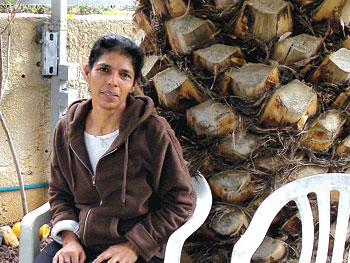
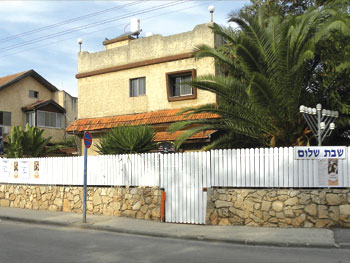
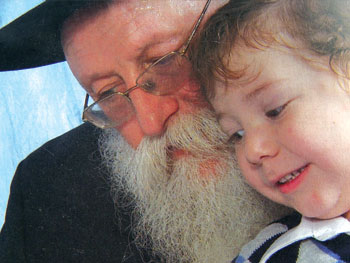
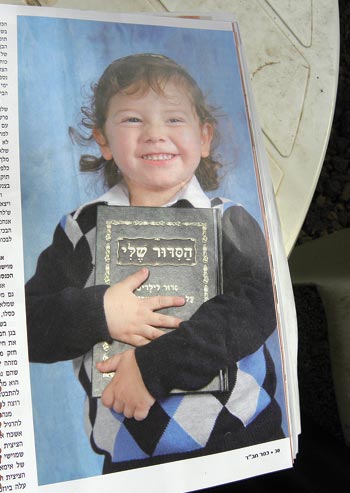
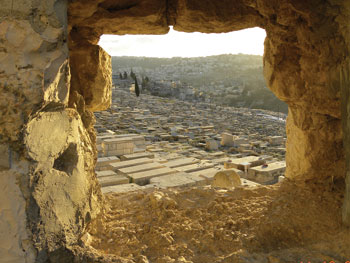
article